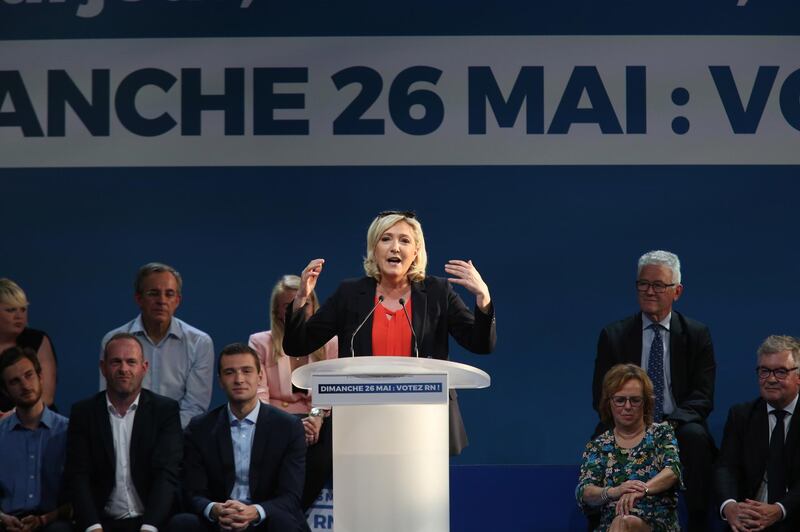Marine Le Pen, leader of the French far-right party Rassemblement National, is heavily tipped to be one of the big winners of this weekend's European parliament elections.
Humiliated by Emmanuel Macron's triumph in the 2017 French presidential contest, Ms Le Pen has projected the right mix of outrage and frustration to lead the opinion polls this time round.
A win for Ms Le Pen will prove that these elections have rewarded a paucity of policy. Movements that propose nothing, rubbish everything and rely on stirring up resentment and anger have been at the forefront of the news in many European countries.
One revealing glimpse of Ms Le Pen on the campaign trail last week came when she was asked about her environmental ideas. The topic is hardly novel. Protest movements on the issue of climate change are common in Europe.
In response, she then launched into a speech about ecology being tied to identity. People who trashed the environment then moved to other parts of the world was her thesis. This rant against migration was all the green policy she could muster.
The rising popularity of figures such as Ms Le Pen will be felt around the world. Migration is a hot topic and the European parliament could become a platform of protest for them.
The four-decades-old institution remains a work-in-progress. It has steadily become more important, but piecemeal advances mean its resilience has not yet been proven.
It is expected that these elections will end the dominance of the two large centrist blocs: the Social Democrats and the European People's Party. Both have controlled the presidency and prevailed in the European parliament's committee system for many years. Now, polls indicate that this duopoly will crack, but not break.
The power brokers can be expected to turn to the also-rans for a majority, either with the Alliance of Liberals and Democrats for Europe or the Greens. The strength of President Macron will be key to this, as his French MEPs are expected to join the liberal bloc for the first time.
The European electorate is enormously volatile, so the composition of the house remains hard to gauge. There is for example a good chance that the turnout will be higher than normal this year, bucking a downward trend.
The signs are that this rise in participation will be driven by moderates concerned about the ethno-nationalist lurch in European politics. The beneficiaries could be smaller factions, such as the liberals, which will offset but not blunt entirely the rise of hardliners.
But the hard-left and far-right should not be counted as mere spoilers that roar from the sidelines. These groups are far better organised than ever before. True to their roots, they remain noisy, but experience has sharpened the political talons.
Ms Le Pen failed to win the French presidency in 2017, but she has bounced back. There are similar tales elsewhere, including that of Nigel Farage, the British campaigner, who declared himself semi-retired not so long ago. Others were more successful in clambering to the political summit, most notably in Italy where the once fringe League and Five Star Movement parties jointly control the government.
With a perhaps temporary boost from the UK, where the upstart Brexit Party is likely to emerge at the head of the field, hardline alliances should be able to take control of some committees and, with that, gain the ability to change or block legislation.
The lack of debate in the campaign on the big issues, therefore, matters. Ms Le Pen's ecological views are a form of wilful ignorance. The same is true of the big economic questions and the progress of new rounds of trade liberalisation.
With a weaker leadership and Eurosceptics working to sow confusion, the European parliament will inevitably be a less reliable player in the continent's already questionable power matrix. That will have knock-on effects on other institutions, including the make-up of the European Commission leadership.
The parliament had been widening its powers and maturing as a legislative body. It has had some important achievements with global resonance, such as the General Data Protection Regulation, and its trade deals with Canada, Japan and South Korea are some of the most ambitious ever seen.
In an era of great power competition, Europe has forged a unique identity. The pitfalls of Europe as a player are well known, especially as it goes through a very messy divorce with Britain.
A European parliament that shirks its role would have worldwide consequences at a time when the margin of error for all is perilously thin.





